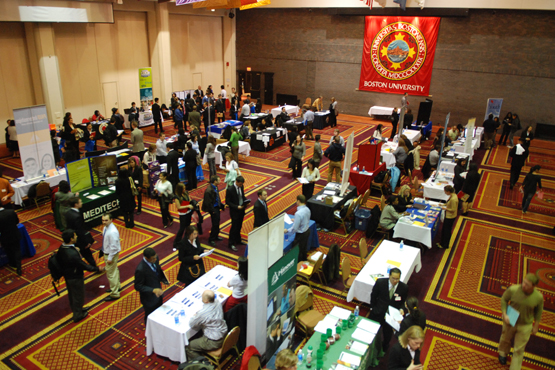They’re Still Around, Just Harder to Find
Recruiters offer tips for landing a job or internship

This world is full of choices, and here are the big three on campus: Where are you gonna live? What are you gonna major in? What kind of job are you gonna get?
BU Today is onto all three this week, beginning Tuesday with housing, segueing to a first-person account of “major confusion” yesterday, and wrapping up today with a look at the help available to find a job — even in this economy.
Christen Wong will soon need a job. She’s busy building contacts, setting up informational interviews, and attending campus career fairs, because she knows the power of networking. “But most of all, I’m trying to be optimistic ,” says Wong (COM’09).
She realizes the scene is grim. Companies are laying off and promoting less often, leaving fewer opportunities for recent college graduates. The Massachusetts unemployment rate increased from 7.4 percent in January to 7.8 percent in February, and the national unemployment rate climbed from 7.6 percent to 8.1 percent during that time.

Graduating seniors and students looking for internships cannot help but worry, but that won’t help them find a job. The Office of Career Services (OCS) wants to help, and last week held a Spring Job & Internship Fair in the George Sherman Union’s Metcalf Hall.
Yet not all BU students were pleased with the employer turnout — one more sign of the economic downturn.
Victoria Yen (SMG’09) came looking for marketing positions and was disappointed to find that not many companies were offering jobs in that field. Fidelity Investments and John Hancock, the companies with the most students hoping to find openings, had very few jobs available and used the fair to field questions and offer more general advice. Other companies present included Nestlé and the one employer sure to be hiring through thick and thin: the Internal Revenue Service.
Here are some thumbnails of key insights gleaned:
Do your homework
Rhonda Grant, a recruiter with the Vitamin Shoppe, said the biggest mistake people make is not prepping for an interview. “If they don’t know the basic facts about the company, it shows me that they’re not interested, because they couldn’t be bothered to visit the Web site the night before,” she said. Several recruiters also stressed the importance of asking the interviewer questions, in effect turning the interview around, because this shows interest in the company and the job.
Make your résumé perfect
Update your résumé with your most recent contact information. Change the résumé’s objective if you’re applying for jobs in different fields. Have someone smart and careful read it over and check the spelling. Edit for space. You should be proud if you’ve participated in dozens of extracurriculars, but résumés shouldn’t be three pages long; readers will lose interest. “I wish students would just put industry-related internships and clubs on there, and then tell me about their volunteer work in the interview,” Grant said.

Katie McVey, a recruiter with Abercrombie & Fitch, stressed the importance of being truthful. “I worked in the Abercrombie retail stores when I was in college, so I know if someone was a part-time sales representative, they weren’t tending the register or having other managerial duties,” she said. Don’t bluff — it makes the potential employer doubt if you can be trusted.
And one more thing: make triple sure to bring copies of the résumé you’ve worked so hard on to every job fair and informational interview.
Be open to change
Think twice about going into an interview with demands. McVey said that she’s “had people come in and say, ‘I only want a marketing job, and I need $60,000 for a starting salary.’ That doesn’t work.”
Don’t worry if the job you’re applying for isn’t exactly what you studied as an undergrad. When Rosanna Kelleher, a recruiter with Riverside Community Care, interviews a potential candidate, she said, she is “really looking for transferable skills, someone who’s open-ended and able to adjust.” Staying open-minded about new fields means more potential jobs.

Attend career fairs and other networking opportunities
Ihssane Leckey (CAS’11) (right) is looking for her first internship; she prepared for the fair by doing some research. She recommended honing in on the top five companies you’re interested in, with a few backups. “I found that when you get to the career fair, you should talk to the backups first to settle your nerves and to gain more confidence,” she said. “Then go to your top five companies, because you’ll be comfortable by that point.”
And don’t forget to…
Dress appropriately. “Crocs and jeans are not acceptable,” Kelleher said.
“Graduating from college is an enormous step,” said Deborah Halliday, associate director of OCS. “Students are sometimes afraid they won’t do it right, but I tell them there’s no right way to do this transition.”
Bottom line: if you sit back and think finding a job is hopeless, you’ll surely be right — you won’t find any work. Now more than ever is the moment to get creative with how you search and how you market yourself.
Amy Laskowski can be reached at amlaskow@bu.edu. Brendan Gauthier can be reached at btgauth@bu.edu.

Comments & Discussion
Boston University moderates comments to facilitate an informed, substantive, civil conversation. Abusive, profane, self-promotional, misleading, incoherent or off-topic comments will be rejected. Moderators are staffed during regular business hours (EST) and can only accept comments written in English. Statistics or facts must include a citation or a link to the citation.